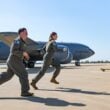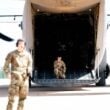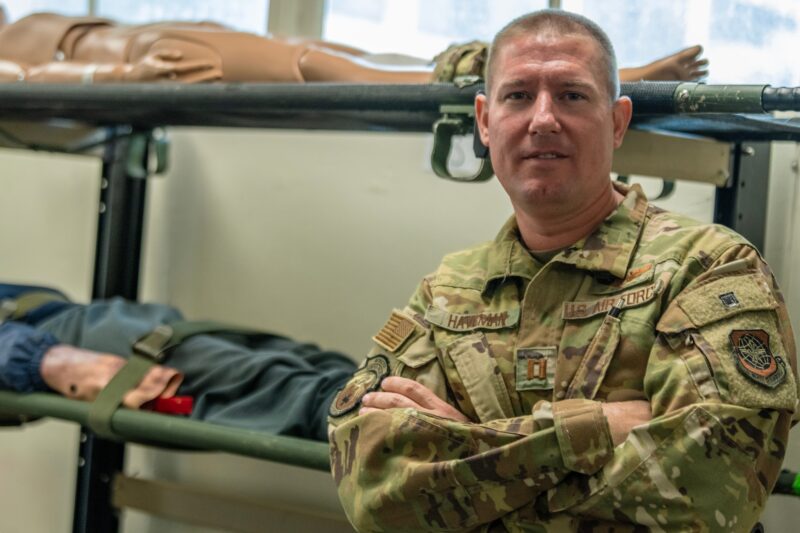TRAVIS AIR FORCE BASE, Calif. —
In a heart-pounding display of courage and quick-thinking, Capt. Joshua Haveman, 60th Air Evacuation Squadron flight instructor, showcased extraordinary bravery and resourcefulness during a perilous rescue on the slopes of Half Dome in Yosemite National Park.
The rescue unfolded on Sept. 2, 2023, during the final 400 feet of Haveman’s summit attempt on the iconic Half Dome, which stands at an imposing 8,842 feet. The incident began when a fellow climber plummeted 60 to 80 feet, landing precariously on a ledge suspended over 8,000 feet above the valley floor.
“I knew people were going to be in trouble as soon as I topped the hill because it was cold and windy, and people were getting desperate trying to come down holding a slick metal cable on slick granite. I put down my bookbag, pulled out my medical kit and headed in that direction,” said Haveman. “About that time, I heard someone scream out, so I looked up and saw this person sliding about 80 feet down and land on the only spot that would have saved him – a 6-foot by 1 1/2-foot ledge that separates him from another 500-foot to 1,000-foot fall.”
Without hesitation, Haveman took action. Faced with harsh winds and hail, he made a daring decision to venture outside the permanent cable barriers to reach the fallen climber. His climbing experience and extensive medical training proved invaluable in this life-or-death situation.
“You could see that his legs were not naturally oriented at all, so I started collecting sticks from sub-dome and started climbing,” Haveman recalled. “Other climbers were concerned for my safety, but the guy was just up there screaming in pain, so I left the cable area and climbed on the ledge.”
Using makeshift splints fashioned from sticks, Haveman provided crucial first aid to the injured climber by securing above and below the tibia/fibula fracture and wrapped his injured ankle with an ace bandage. To shield the climber from the harsh elements and apparent shock, Haveman selflessly covered the climber with his jacket.
During this harrowing period, Haveman also played a vital role in coordinating a call to the park’s ranger station, alerting authorities to the situation. His quick thinking and effective communication ensured that more help would be on the way.
Moments after the call, a Search and Rescue Park Ranger arrived on the scene, and Haveman seamlessly transitioned into a supporting role. Together, they facilitated the patient’s descent via a cable ladder, provided further essential medical treatment and administered care for shock.
“After about 45 minutes, the Park Ranger emergency medical technician came up with a full medical bag, so we were able to use a structural aluminum malleable (SAM) splint to better stabilize him,” Haveman explained. “The weather was improving, so more climbers were able to come up and offer their assistance. They took up a collection for supplies that we were able to use to make an improvised pulley system to lower him the 30 feet down to sub dome.”
Ultimately, the climber was medically evacuated via helicopter, receiving the critical medical attention they urgently required. Without Haveman’s swift and selfless actions, the outcome could have been far more tragic.
“I wasn’t sure a helicopter would be able to land with the winds being as strong as they were, so we were preparing to carry him 10 or 12 hours down with a six-man litter,” Haveman said with pause. “Apparently, it was this pilot’s first day on the job, and he was amazing! It took him about 15 minutes, but he was able to sit the chopper down and we were able to get the patient loaded and breathe a sigh of relief.”
The remarkable rescue on the slopes of Half Dome serves as an inspirational reminder of the extraordinary bravery, dedication and sacrifice of those in the armed forces, not only in combat, but also as everyday heroes who rise to the occasion when their skills and expertise are needed most.









